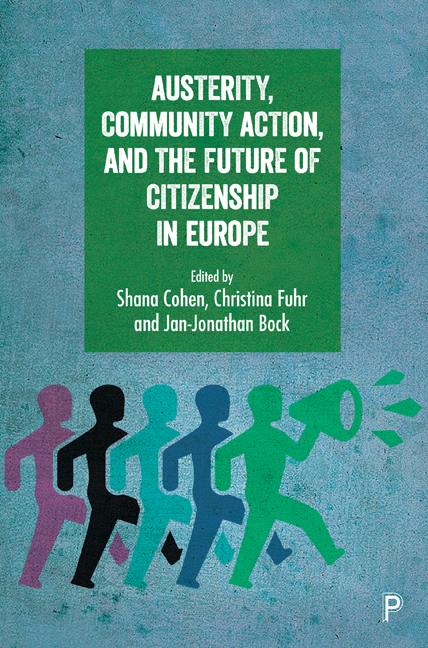Book contents
- Frontmatter
- Dedication
- Contents
- Acknowledgements
- Notes on contributors
- one Introduction: social activism, belonging and citizenship in a period of crisis
- Part I The social consequences of welfare policy
- Part II The practice of social good
- Part III Social change and neoliberalism
- Part IV Situating solidarity in perspective
- Index
Six - Community finance: the emergence of credit unions in London
Published online by Cambridge University Press: 05 April 2022
- Frontmatter
- Dedication
- Contents
- Acknowledgements
- Notes on contributors
- one Introduction: social activism, belonging and citizenship in a period of crisis
- Part I The social consequences of welfare policy
- Part II The practice of social good
- Part III Social change and neoliberalism
- Part IV Situating solidarity in perspective
- Index
Summary
In the United Kingdom (UK), credit union interventions to serve the poor and financially excluded have been recognised by local and regional government and supported, from the beginning of the 1990s, by grant aid and in-kind support (Jones, 1999). Tackling financial exclusion through credit unions became UK government policy and strategy from around 1999 (HM Treasury, 1999) and, by 2006, credit unions were receiving significant financial investment from local government to expand their reach in low-income communities. Credit unions have also been supported through multiple partnerships with churches and faith organisations, housing associations, community associations, trade unions and employers, all of which have acknowledged the important role of credit unions in serving less well-off members of society. The Most Reverend Justin Welby, Archbishop of Canterbury, for example, famously advanced the role of credit unions in combatting highcost, payday lenders, which he maintained caused severe detriment to financially vulnerable individuals in low- and moderate-income households. For the Archbishop, credit unions offered an ethical and practical alternative.
Yet, this focus on serving financially excluded individuals and communities has proved to be a two-edged sword for most British credit unions. On the one hand, credit unions have realised their social goals and succeeded in engaging many thousands of people alienated and marginalised from mainstream financial services provision. This success undoubtedly raised political support for and expectations of the sector. Seen as being able to reach out to the poor, they are now regarded by government and others as being able to play a major role in supporting low-income families and, more recently, assuaging the impact of the UK government's welfare reform programme through the provision of affordable and supportive services. However, the rub is that success in serving people on low incomes has often resulted in the weakening of credit unions as financial institutions.
The reality is that serving high-risk vulnerable individuals, commonly demanding additional staff time and resources, is a high-cost endeavour. Restricted by law and by ethics from charging higher rates on loans and fees, credit unions serving mainly low-income communities can struggle to ensure their own economic sustainability. As such many remained dependent on external grant funding to serve these groups (Myers et al, 2012).
- Type
- Chapter
- Information
- Austerity Community Action and the Future of Citizenship , pp. 95 - 114Publisher: Bristol University PressPrint publication year: 2017

